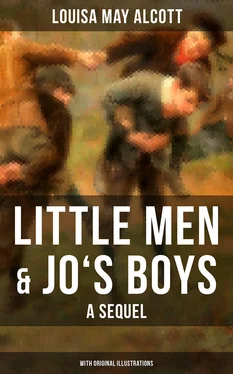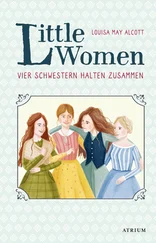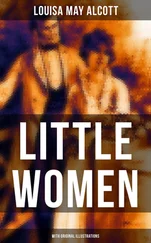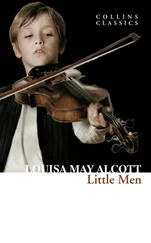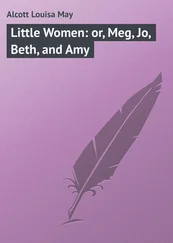1 ...6 7 8 10 11 12 ...30 As he looked about him Nat thought it seemed more like a great family than a school, for the lads were sitting in a wide half-circle round the fire, some on chairs, some on the rug, Daisy and Demi on the knees of Uncle Fritz, and Rob snugly stowed away in the back of his mother's easy-chair, where he could nod unseen if the talk got beyond his depth.
Every one looked quite comfortable, and listened attentively, for the long walk made rest agreeable, and as every boy there knew that he would be called upon for his views, he kept his wits awake to be ready with an answer.
"Once upon a time," began Mr. Bhaer, in the dear old-fashioned way, "there was a great and wise gardener who had the largest garden ever seen. A wonderful and lovely place it was, and he watched over it with the greatest skill and care, and raised all manner of excellent and useful things. But weeds would grow even in this fine garden; often the ground was bad and the good seeds sown in it would not spring up. He had many under gardeners to help him. Some did their duty and earned the rich wages he gave them; but others neglected their parts and let them run to waste, which displeased him very much. But he was very patient, and for thousands and thousands of years he worked and waited for his great harvest."
"He must have been pretty old," said Demi, who was looking straight into Uncle Fritz's face, as if to catch every word.
"Hush, Demi, it's a fairy story," whispered Daisy.
"No, I think it's an arrygory," said Demi.
"What is a arrygory?" called out Tommy, who was of an inquiring turn.
"Tell him, Demi, if you can, and don't use words unless you are quite sure you know what they mean," said Mr. Bhaer.
"I do know, Grandpa told me! A fable is a arrygory; it's a story that means something. My 'Story without an end' is one, because the child in it means a soul; don't it, Aunty?" cried Demi, eager to prove himself right.
"That's it, dear; and Uncle's story is an allegory, I am quite sure; so listen and see what it means," returned Mrs. Jo, who always took part in whatever was going on, and enjoyed it as much as any boy among them.
Demi composed himself, and Mr. Bhaer went on in his best English, for he had improved much in the last five years, and said the boys did it.
"This great gardener gave a dozen or so of little plots to one of his servants, and told him to do his best and see what he could raise. Now this servant was not rich, nor wise, nor very good, but he wanted to help because the gardener had been very kind to him in many ways. So he gladly took the little plots and fell to work. They were all sorts of shapes and sizes, and some were very good soil, some rather stony, and all of them needed much care, for in the rich soil the weeds grew fast, and in the poor soil there were many stones."
"What was growing in them besides the weeds, and stones?" asked Nat; so interested, he forgot his shyness and spoke before them all.
"Flowers," said Mr. Bhaer, with a kind look. "Even the roughest, most neglected little bed had a bit of heart's-ease or a sprig of mignonette in it. One had roses, sweet peas, and daisies in it," here he pinched the plump cheek of the little girl leaning on his arm. "Another had all sorts of curious plants in it, bright pebbles, a vine that went climbing up like Jack's beanstalk, and many good seeds just beginning to sprout; for, you see, this bed had been taken fine care of by a wise old man, who had worked in gardens of this sort all his life."
At this part of the "arrygory," Demi put his head on one side like an inquisitive bird, and fixed his bright eye on his uncle's face, as if he suspected something and was on the watch. But Mr. Bhaer looked perfectly innocent, and went on glancing from one young face to another, with a grave, wistful look, that said much to his wife, who knew how earnestly he desired to do his duty in these little garden plots.
"As I tell you, some of these beds were easy to cultivate, that means to take care of Daisy, and others were very hard. There was one particularly sunshiny little bed that might have been full of fruits and vegetables as well as flowers, only it wouldn't take any pains, and when the man sowed, well, we'll say melons in this bed, they came to nothing, because the little bed neglected them. The man was sorry, and kept on trying, though every time the crop failed, all the bed said, was, 'I forgot.' "
Here a general laugh broke out, and every one looked at Tommy, who had pricked up his ears at the word "melons," and hung down his head at the sound of his favorite excuse.
"I knew he meant us!" cried Demi, clapping his hands. "You are the man, and we are the little gardens; aren't we, Uncle Fritz?"
"You have guessed it. Now each of you tell me what crop I shall try to sow in you this spring, so that next autumn I may get a good harvest out of my twelve, no, thirteen, plots," said Mr. Bhaer, nodding at Nat as he corrected himself.
"You can't sow corn and beans and peas in us. Unless you mean we are to eat a great many and get fat," said Stuffy, with a sudden brightening of his round, dull face as the pleasing idea occurred to him.
"He don't mean that kind of seeds. He means things to make us good; and the weeds are faults," cried Demi, who usually took the lead in these talks, because he was used to this sort of thing, and liked it very much.
"Yes, each of you think what you need most, and tell me, and I will help you to grow it; only you must do your best, or you will turn out like Tommy's melons, all leaves and no fruit. I will begin with the oldest, and ask the mother what she will have in her plot, for we are all parts of the beautiful garden, and may have rich harvests for our Master if we love Him enough," said Father Bhaer.
"I shall devote the whole of my plot to the largest crop of patience I can get, for that is what I need most," said Mrs. Jo, so soberly that the lads fell to thinking in good earnest what they should say when their turns came, and some among them felt a twinge of remorse, that they had helped to use up Mother Bhaer's stock of patience so fast.
Franz wanted perseverance, Tommy steadiness, Ned went in for good temper, Daisy for industry, Demi for "as much wiseness as Grandpa," and Nat timidly said he wanted so many things he would let Mr. Bhaer choose for him. The others chose much the same things, and patience, good temper, and generosity seemed the favorite crops. One boy wished to like to get up early, but did not know what name to give that sort of seed; and poor Stuffy sighed out,
"I wish I loved my lessons as much as I do my dinner, but I can't."
"We will plant self-denial, and hoe it and water it, and make it grow so well that next Christmas no one will get ill by eating too much dinner. If you exercise your mind, George, it will get hungry just as your body does, and you will love books almost as much as my philosopher here," said Mr. Bhaer; adding, as he stroked the hair off Demi's fine forehead, "You are greedy also, my son, and you like to stuff your little mind full of fairy tales and fancies, as well as George likes to fill his little stomach with cake and candy. Both are bad, and I want you to try something better. Arithmetic is not half so pleasant as 'Arabian Nights,' I know, but it is a very useful thing, and now is the time to learn it, else you will be ashamed and sorry by and by."
"But, 'Harry and Lucy,' and 'Frank,' are not fairy books, and they are all full of barometers, and bricks, and shoeing horses, and useful things, and I'm fond of them; ain't I, Daisy?" said Demi, anxious to defend himself.
"So they are; but I find you reading 'Roland and Maybird,' a great deal oftener than 'Harry and Lucy,' and I think you are not half so fond of 'Frank' as you are of 'Sinbad.' Come, I shall make a little bargain with you both, George shall eat but three times a day, and you shall read but one story-book a week, and I will give you the new cricket-ground; only, you must promise to play in it," said Uncle Fritz, in his persuasive way, for Stuffy hated to run about, and Demi was always reading in play hours.
Читать дальше
